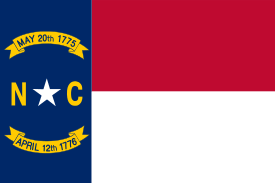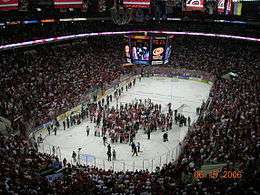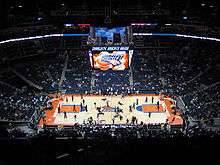Charlotte Checkers (1956–77)
| Charlotte Checkers | |
|---|---|
| City | Charlotte, North Carolina |
| League |
Eastern Hockey League (1956-73) Southern Hockey League (1973-77) |
| Operated | 1956–1977 |
| Home arena | Charlotte Coliseum |
| Franchise history | |
| 1954–1956 | Baltimore Clippers |
| 1956–1960 | Charlotte Clippers |
| 1960–1977 | Charlotte Checkers |
The Charlotte Checkers were an American ice hockey team in Charlotte, North Carolina, playing in the Eastern Hockey League and Southern Hockey League.
Franchise history
Origin
The first effort to bring professional hockey to Charlotte began with the formation of the Charlotte Hockey Club, a group of local businessmen represented by Bill Shields who lobbied for a franchise in the Eastern Hockey League. On Jan. 23, 1956, a mechanical fire caused the total destruction of the Carlin's Iceland rink in Baltimore, leaving the EHL's Baltimore Clippers without a home rink for the remainder of their schedule. Clippers owner Charlie Rock was approached by Shields with an offer to play some of the games newly dedicated Charlotte Coliseum, with the ultimate aim of securing the franchise in Charlotte for the following season as well. Rock agreed to play five of the Clippers' remaining twelve home games in Charlotte.
At the time, there was little precedent for hockey in the American South. Aside from an abortive attempt to form a league in Florida during the 1930s, no professional team had ever played south of Louisville, Kentucky or east of Houston, Texas. The EHL approved the move, and only a week later the temporarily renamed "Rebels" played their first game in Charlotte. The result was a smashing success at the gate—an over-capacity crowd of 10,363 turned out for the debut, with an estimated 3,000 turned away. In all, the first five games in Charlotte drew a crowd of nearly 40,000, prompting Rock to keep the franchise in Charlotte for good.
Early Success
Buoyed by immediate financial success, the Clippers quickly became a powerhouse team. The forward corps included the EHL's top three scorers: Al "Bibber" O'Hearn (117), Doug Adam (114) and Chuck Stuart (108). The defense was led by future NHL coaches John Muckler and John Brophy. In goal was future Pittsburgh Penguins goaltender Les Binkley. The Clippers cruised to the best record in EHL history, losing only 13 of their 64 games, and won the 1957 playoff championship over Philadelphia. Attendance was around 4,000 per game, best in the EHL.
In 1958, the team slipped slightly but still won the regular-season title by a single point. Forward Stan Warecki took over coaching duties for Andy Brown, but Warecki quit mid-season and Brown stepped back into the role. The Clippers lacked the overwhelming scoring punch of the previous season, and narrowly lost a 7-game Finals series to Washington.
Fall and Rise during the 1960s
Beginning in 1958-59, the team tumbled out of contention. Last-place finishes in three out of four seasons were interrupted only in 1960, when the team was eliminated in the first round of the playoffs. An ownership change in 1960 brought a name change to Checkers, which has since been the only name used by Charlotte's professional hockey teams.
The Checkers continued to struggle until the mid-1960s, when former player Fred Creighton took over coaching duties from NHL legend Turk Broda. Creighton, who would later coach the NHL's Atlanta Flames and Boston Bruins, led the team out of the doldrums with 7 consecutive winning seasons including a run to the league Finals in 1968 and consecutive regular season and playoff championships in 1971 and 1972. Star players during this period included Maurice "Moe" Savard, Barry Simpson, and future NHL players John Gould and Rick Foley.
SHL years
By minor league standards, the Checkers were stable and well-supported as a fixture on the minor league hockey circuit. Along with most of the EHL's Southern Division, the Checkers joined the Southern Hockey League in 1973, along with the Macon Whoopees, Greensboro Generals, Roanoke Valley Rebels, Suncoast Suns and Winston-Salem Polar Twins. Charlotte would win SHL titles in 1974–75 and 1975–76 before that league's demise in the middle of the 1976–77 season in the face of severe financial difficulty. Despite the Checkers' popularity, professional hockey would not return to Charlotte until 1993.
Season-by-season record
Note: GP = Games played, W = Wins, L = Losses, T = Ties, OTL = Overtime Losses, Pts = Points, GF = Goals for, GA = Goals against
| Season | League | GP | W | L | OTL | Pts | GF | GA | Finish | Playoffs |
| 1956-57 | EHL | 64 | 50 | 13 | 1 | 101 | 364 | 239 | 1st | Won Championship |
| 1957-58 | EHL | 64 | 38 | 25 | 1 | 77 | 275 | 243 | 1st | Lost in Finals |
| 1958-59 | EHL | 64 | 24 | 38 | 2 | 50 | 209 | 283 | 6th | Did not qualify |
| 1959-60 | EHL | 64 | 31 | 29 | 4 | 66 | 243 | 244 | 2nd, Southern | Lost in First Round |
| 1960-61 | EHL | 64 | 25 | 34 | 5 | 55 | 221 | 265 | 4th, Southern | Did not qualify |
| 1961-62 | EHL | 68 | 26 | 40 | 2 | 54 | 226 | 270 | 4th, Southern | Did not qualify |
| 1962-63 | EHL | 68 | 35 | 31 | 2 | 72 | 242 | 264 | 3rd, Southern | Lost in Second Round |
| 1963-64 | EHL | 72 | 30 | 41 | 1 | 61 | 276 | 304 | 4th, Southern | Lost in First Round |
| 1964-65 | EHL | 72 | 35 | 35 | 2 | 72 | 262 | 286 | 3rd, Southern | Lost in First Round |
| 1965-66 | EHL | 72 | 42 | 30 | 0 | 84 | 300 | 251 | 2nd, Southern | Lost in Second Round |
| 1966-67 | EHL | 72 | 36 | 33 | 3 | 75 | 259 | 235 | 2nd, Southern | Lost in Second Round |
| 1967-68 | EHL | 72 | 42 | 21 | 9 | 93 | 333 | 243 | 2nd, Southern | Lost in Finals |
| 1968-69 | EHL | 72 | 37 | 29 | 6 | 80 | 274 | 381 | 3rd, Southern | Lost in First Round |
| 1969-70 | EHL | 74 | 34 | 31 | 9 | 77 | 284 | 266 | 3rd, Southern | Lost in Second Round |
| 1970-71 | EHL | 74 | 55 | 12 | 7 | 117 | 383 | 153 | 1st, Southern | Won Championship |
| 1971-72 | EHL | 73 | 47 | 18 | 8 | 102 | 330 | 180 | 1st, Southern | Won Championship |
| 1972-73 | EHL | 76 | 26 | 40 | 10 | 62 | 241 | 313 | 4th, Southern | Did not qualify |
| 1973-74 | SHL | 72 | 44 | 27 | 1 | 86 | 309 | 227 | 2nd | Lost in First Round |
| 1974-75 | SHL | 72 | 50 | 21 | 1 | 101 | 370 | 256 | 1st | Won Championship |
| 1975-76 | SHL | 72 | 42 | 20 | 10 | 94 | 302 | 206 | 1st | Won Championship |
| 1976-77 | SHL | 50 | 22 | 25 | 3 | 47 | 180 | 186 | 3rd | League folded mid-season |




